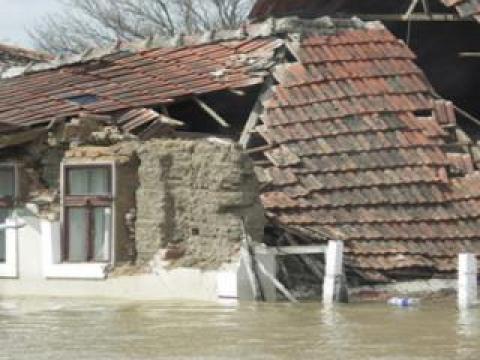Romanian community empowered through a home reconstruction project

In 2005, 25 communities in Timis County in north eastern Romania, close to the border with Serbia, were affected by severe floods. Some 732 houses collapsed and more than 2,700 people had to seek refuge in the homes of their friends and relatives or in temporary shelters.
“I was very afraid because I didn’t know what was going to happen next. It seemed like the end of the world…I didn’t know what was awaiting me and my family in the future. I was watching TV and I was reading in the newspapers about other villages that were also being flooded. People were suffering and I was suffering with them”, remembers 16-year- old Zoran.
World Vision Romania intervened to assist local authorities in providing affected people with food, water, hygiene products and water pumps to help households remove flood water.
Re-building people’s homes, restoring local infrastructure, building shelters for the animals and feeding them, providing children and adults with psychological support became the main objectives of a three-year strategy.
After conducting a rapid assessment of the community’s needs it became obvious that in order to support the community to overcome the tragedy, World Vision Romania needed a long term plan.
“Re-building people’s homes, restoring local infrastructure, building shelters for the animals and feeding them, providing children and adults with psychological support became the main objectives of a three-year strategy”, said Eugen Borlea, Emergencies Relief Manager for World Vision Romania.
Together with a national television station, World Vision organised a fund-raising campaign and managed to raise more than US$1,5 million used to rebuild 31 houses in Foieni community and to provide 76 families with heating stoves.
About 150 children aged between four and 16 have also benefited through psychological therapy to help them cope with the upheaval and changes the flood brought into their lives. Four therapists worked with the children in painting and dance, clay modeling and theatre clubs.
“Three years after the tragedy, psychological analysis of the children’s status showed that they have managed to overcome the crisis; they are more confident and more able to express their emotions – positive or negative. Significant progress was made in terms of improving their communications skills and establishing social contacts”, said World Vision’s Relief Manager.
During the three-year project implementation, weekly meetings were conducted with community members, with World Vision working closely with them to identify the most appropriate solutions for rebuilding. A community centre was established and an initiative group was born.
He also acknowledged that the community itself has become stronger and more united after facing the crisis together. At the end of the project, discussions about the possibility of creating a local community based organisation to represent the interests of the members of the community were launched.
“I was very afraid because I didn’t know what was going to happen next. It seemed like the end of the world…I didn’t know what was awaiting me and my family in the future. I was watching TV and I was reading in the newspapers about other villages that were also being flooded. People were suffering and I was suffering with them”, remembers 16-year- old Zoran.
World Vision Romania intervened to assist local authorities in providing affected people with food, water, hygiene products and water pumps to help households remove flood water.
Re-building people’s homes, restoring local infrastructure, building shelters for the animals and feeding them, providing children and adults with psychological support became the main objectives of a three-year strategy.
After conducting a rapid assessment of the community’s needs it became obvious that in order to support the community to overcome the tragedy, World Vision Romania needed a long term plan.
“Re-building people’s homes, restoring local infrastructure, building shelters for the animals and feeding them, providing children and adults with psychological support became the main objectives of a three-year strategy”, said Eugen Borlea, Emergencies Relief Manager for World Vision Romania.
Together with a national television station, World Vision organised a fund-raising campaign and managed to raise more than US$1,5 million used to rebuild 31 houses in Foieni community and to provide 76 families with heating stoves.
About 150 children aged between four and 16 have also benefited through psychological therapy to help them cope with the upheaval and changes the flood brought into their lives. Four therapists worked with the children in painting and dance, clay modeling and theatre clubs.
“Three years after the tragedy, psychological analysis of the children’s status showed that they have managed to overcome the crisis; they are more confident and more able to express their emotions – positive or negative. Significant progress was made in terms of improving their communications skills and establishing social contacts”, said World Vision’s Relief Manager.
During the three-year project implementation, weekly meetings were conducted with community members, with World Vision working closely with them to identify the most appropriate solutions for rebuilding. A community centre was established and an initiative group was born.
He also acknowledged that the community itself has become stronger and more united after facing the crisis together. At the end of the project, discussions about the possibility of creating a local community based organisation to represent the interests of the members of the community were launched.
Share